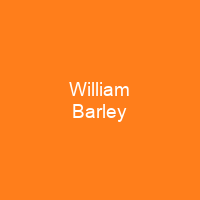William Barley: The Elizabethan Bookseller’s Journey
Imagine a world where books were not just words on paper but gateways to knowledge and creativity, and one man was at the heart of this transformation. William Barley (1565? – 1614) was such a figure in the Elizabethan era. Born in Warwickshire around 1565, he embarked on an apprenticeship as a draper but soon found his true calling in the London book trade. His journey through this world of books and music is both fascinating and complex.
From Draper to Bookseller
How did Barley transition from selling fabrics to selling knowledge? In 1587, he completed his apprenticeship as a draper but quickly shifted gears. By the early 1590s, Barley was operating shops in both London and Oxford, where he began publishing works that would shape the literary landscape of his time.
The Stationers’ Company Dispute
Barley’s relationship with the Stationers’ Company was fraught with tension. A dispute over rights led to a lifetime of legal troubles for him. This company, which held a monopoly on printing and publishing in England, often clashed with Barley due to his independent spirit and innovative approach. His partnership with Thomas Morley brought some stability but also introduced new challenges when Morley died in 1600.
Music Publishing and Legal Battles
Barley’s contributions to music publishing were significant, yet fraught with controversy. In 1596, he published ‘The Pathway to Music’ and ‘A New Booke of Tabliture,’ but both works featured numerous errors and were criticized for their poor quality. Despite this, these publications seem to have been instrumental in introducing music tutor books to the London market. However, Barley faced legal battles over his rights to publish music books, which often pitted him against the Stationers’ Company.
The Partnership with Thomas Morley
Barley’s partnership with Thomas Morley was a high point in his career but also a source of conflict. After Morley died in 1600, Barley faced increasing pressure from the Stationers’ Company and legal troubles. Despite pleading his innocence, he was found guilty and sentenced to prison. His relationship with Morley was short-lived, and after Morley’s death, Barley came under even more scrutiny from the company.
The Transfer to the Stationers’ Company
In 1605, Barley petitioned the Drapers’ Company for transfer to the Stationers’ Company. He was admitted as a member on June 25, 1606, but his journey was far from over. A settlement in his lawsuit with East recognized Barley’s rights on certain music books but required him to acknowledge East’s name on the imprint and pay him 20 shillings. Despite this, only half of known music books published between 1606-1613 recognized Barley’s patent.
Legacy and Final Years
Barley’s final years were marked by continued legal battles and reduced output. He died in 1614, leaving behind a legacy that was both celebrated and contested. His widow Mary transferred some of his patents to printers John Beale and Thomas Snodham, ensuring that his work would continue to influence the publishing world even after his death.

William Barley’s journey through the Elizabethan book trade was a testament to his resilience and innovation. Despite facing numerous legal battles and personal challenges, he left an indelible mark on the publishing world of his time. His story serves as a reminder that in the pursuit of knowledge and creativity, one must navigate both the successes and setbacks with determination and integrity.
You want to know more about William Barley?
This page is based on the article William Barley published in Wikipedia (retrieved on November 29, 2024) and was automatically summarized using artificial intelligence.







